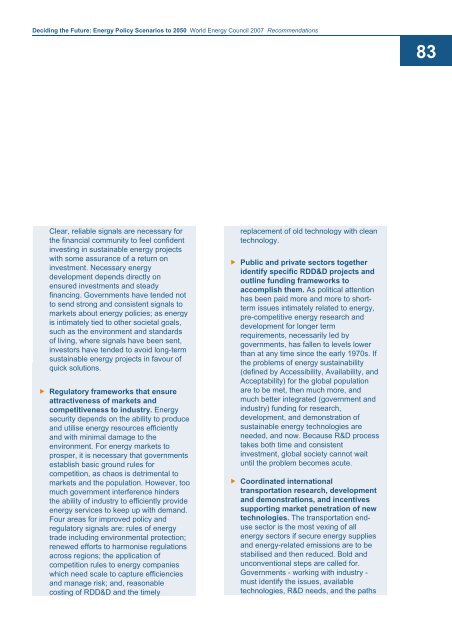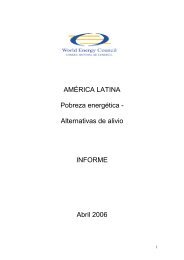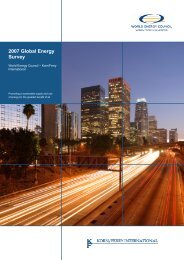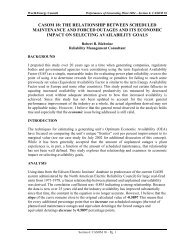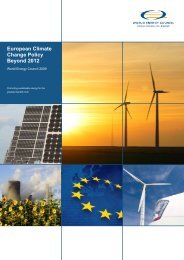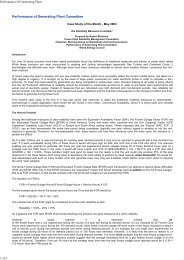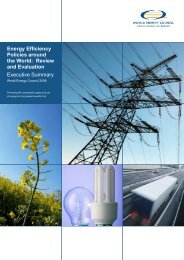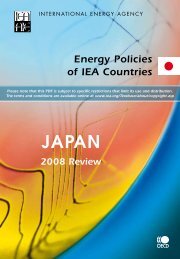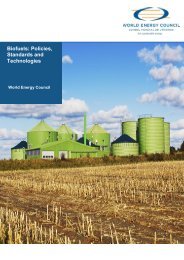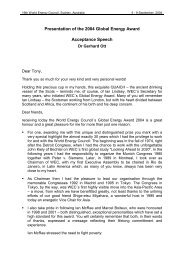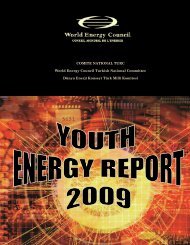Deciding the Future: Energy Policy Scenarios to 2050
Deciding the Future: Energy Policy Scenarios to 2050
Deciding the Future: Energy Policy Scenarios to 2050
Create successful ePaper yourself
Turn your PDF publications into a flip-book with our unique Google optimized e-Paper software.
<strong>Deciding</strong> <strong>the</strong> <strong>Future</strong>: <strong>Energy</strong> <strong>Policy</strong> <strong>Scenarios</strong> <strong>to</strong> <strong>2050</strong> World <strong>Energy</strong> Council 2007 Recommendations<br />
83<br />
Clear, reliable signals are necessary for<br />
<strong>the</strong> financial community <strong>to</strong> feel confident<br />
investing in sustainable energy projects<br />
with some assurance of a return on<br />
investment. Necessary energy<br />
development depends directly on<br />
ensured investments and steady<br />
financing. Governments have tended not<br />
<strong>to</strong> send strong and consistent signals <strong>to</strong><br />
markets about energy policies; as energy<br />
is intimately tied <strong>to</strong> o<strong>the</strong>r societal goals,<br />
such as <strong>the</strong> environment and standards<br />
of living, where signals have been sent,<br />
inves<strong>to</strong>rs have tended <strong>to</strong> avoid long-term<br />
sustainable energy projects in favour of<br />
quick solutions.<br />
Regula<strong>to</strong>ry frameworks that ensure<br />
attractiveness of markets and<br />
competitiveness <strong>to</strong> industry. <strong>Energy</strong><br />
security depends on <strong>the</strong> ability <strong>to</strong> produce<br />
and utilise energy resources efficiently<br />
and with minimal damage <strong>to</strong> <strong>the</strong><br />
environment. For energy markets <strong>to</strong><br />
prosper, it is necessary that governments<br />
establish basic ground rules for<br />
competition, as chaos is detrimental <strong>to</strong><br />
markets and <strong>the</strong> population. However, <strong>to</strong>o<br />
much government interference hinders<br />
<strong>the</strong> ability of industry <strong>to</strong> efficiently provide<br />
energy services <strong>to</strong> keep up with demand.<br />
Four areas for improved policy and<br />
regula<strong>to</strong>ry signals are: rules of energy<br />
trade including environmental protection;<br />
renewed efforts <strong>to</strong> harmonise regulations<br />
across regions; <strong>the</strong> application of<br />
competition rules <strong>to</strong> energy companies<br />
which need scale <strong>to</strong> capture efficiencies<br />
and manage risk; and, reasonable<br />
costing of RDD&D and <strong>the</strong> timely<br />
replacement of old technology with clean<br />
technology.<br />
Public and private sec<strong>to</strong>rs <strong>to</strong>ge<strong>the</strong>r<br />
identify specific RDD&D projects and<br />
outline funding frameworks <strong>to</strong><br />
accomplish <strong>the</strong>m. As political attention<br />
has been paid more and more <strong>to</strong> shortterm<br />
issues intimately related <strong>to</strong> energy,<br />
pre-competitive energy research and<br />
development for longer term<br />
requirements, necessarily led by<br />
governments, has fallen <strong>to</strong> levels lower<br />
than at any time since <strong>the</strong> early 1970s. If<br />
<strong>the</strong> problems of energy sustainability<br />
(defined by Accessibility, Availability, and<br />
Acceptability) for <strong>the</strong> global population<br />
are <strong>to</strong> be met, <strong>the</strong>n much more, and<br />
much better integrated (government and<br />
industry) funding for research,<br />
development, and demonstration of<br />
sustainable energy technologies are<br />
needed, and now. Because R&D process<br />
takes both time and consistent<br />
investment, global society cannot wait<br />
until <strong>the</strong> problem becomes acute.<br />
Coordinated international<br />
transportation research, development<br />
and demonstrations, and incentives<br />
supporting market penetration of new<br />
technologies. The transportation enduse<br />
sec<strong>to</strong>r is <strong>the</strong> most vexing of all<br />
energy sec<strong>to</strong>rs if secure energy supplies<br />
and energy-related emissions are <strong>to</strong> be<br />
stabilised and <strong>the</strong>n reduced. Bold and<br />
unconventional steps are called for.<br />
Governments - working with industry -<br />
must identify <strong>the</strong> issues, available<br />
technologies, R&D needs, and <strong>the</strong> paths


